20 Feb 2017 | News and features, Youth Board
[vc_row][vc_column][vc_column_text]Index on Censorship has recruited a new youth board to sit until June 2017. The group is made up of young students, journalists and legal professionals from countries including India, Hungary and the Republic of Ireland.
Each month, board members meet online to discuss freedom of expression issues around the world and complete an assignment that grows from that discussion. For their first task the board were asked to write a short bio and take a photo of themselves holding a quote that reflects their belief in free speech.
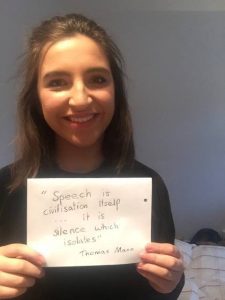 Fionnuala McRedmond – Dublin
Fionnuala McRedmond – Dublin
I graduated last June from the University of Cambridge with a degree in classics. I am now studying for a MSc in political theory at the London School of Economics. I was an active student journalist during my time at Cambridge, and it was there that I first developed an interest in the struggles of censorship and speech across the globe. The propensity for governments to censor speech and ideas is not a modern phenomenon. In ancient Rome book burning was not unheard of, and Cicero once expressed the all too familiar idea: “it is not permitted to say what one thinks… it is obviously permitted to keep silent.” Then, as much as now, free speech was the cornerstone of a healthy society. And then, as much as now, speech was censored by tyrannical power. I am particularly interested in the relationship between censorship and identity. In the past, and even more so now, people have been denied the right to share their words and ideas on the basis of ethnic, religious and political identity. Work by groups like Index on Censorship is crucial in protecting people’s right to speak, no matter who they are. I hope to better understand and develop these ideas with the Index on Censorship youth board.
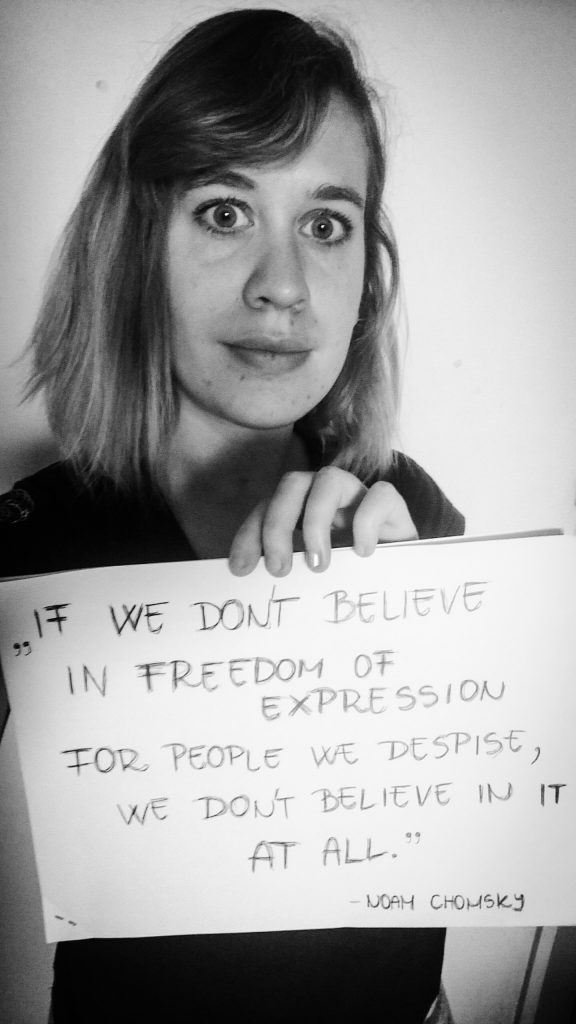 Júlia Bakó – Budapest
Júlia Bakó – Budapest
I am a Hungarian journalist, student and activist currently living in Budapest. After finishing my first degree in journalism, I have started studying international relations.
As a journalist and as someone who is deeply committed to human rights I am naturally drawn to freedom of expression and freedom of press issues. During the last couple of years I have worked with several NGOs and other organisations like Transparency International, Amnesty International, OSCE and Atlatszo.hu. I have dealt with corruption cases as an investigative journalist, I have studied human rights monitoring and – partly because of my studies, but mostly because of my personal interest and commitment – I have tried to explore freedom of expression and other issues not just in my own country, but all over the world, to find patterns, similarities and possible measures that could be taken either on a national or international level.
The quote I chose about freedom of expression says something what we sometimes tend to forget about. Being able to express our own opinions, however right they may seem to us, should never stop us from fighting for the rights of others to be able to act the same way, even though their opinions seem fundamentally different sometimes. Granting the chance to express opinions we do not agree with is what is able to create the diversity of thought, the debate about social issues and with that democracy itself.
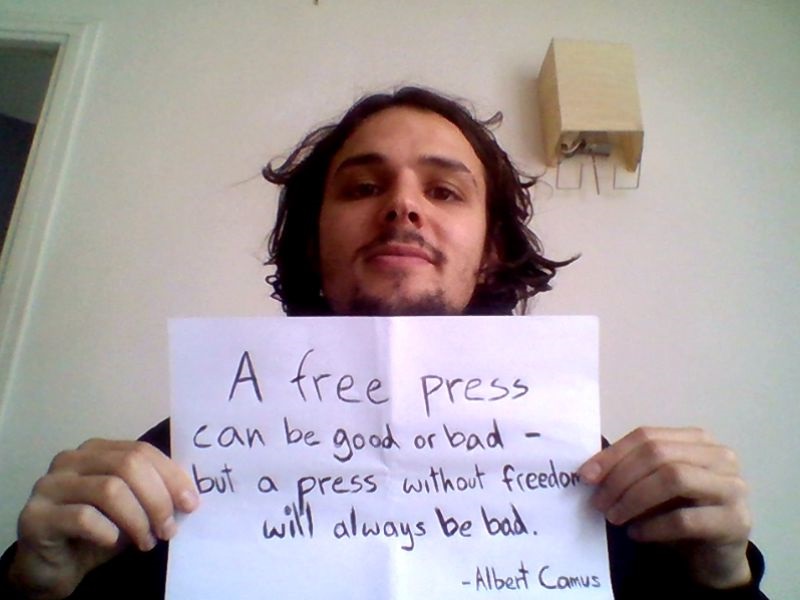 Samuel Earle – Paris
Samuel Earle – Paris
I currently live in Paris, where I am a freelance writer and English teacher.
I became interested in freedom of expression while studying politics at university – first at undergraduate and then at MSc level – and that continues today through my interest in journalism. What’s clear to me is that although freedom of expression is always valuable, the challenges it faces globally are never the same.
In the west, I think there is a complacency concerning freedom of expression: that stopping censorship is assumed to be enough. But I believe that in societies as unequal as our own, and where market forces reign, the value of freedom of expression can be diminished – as shown, for example, by the fake-news phenomenon.
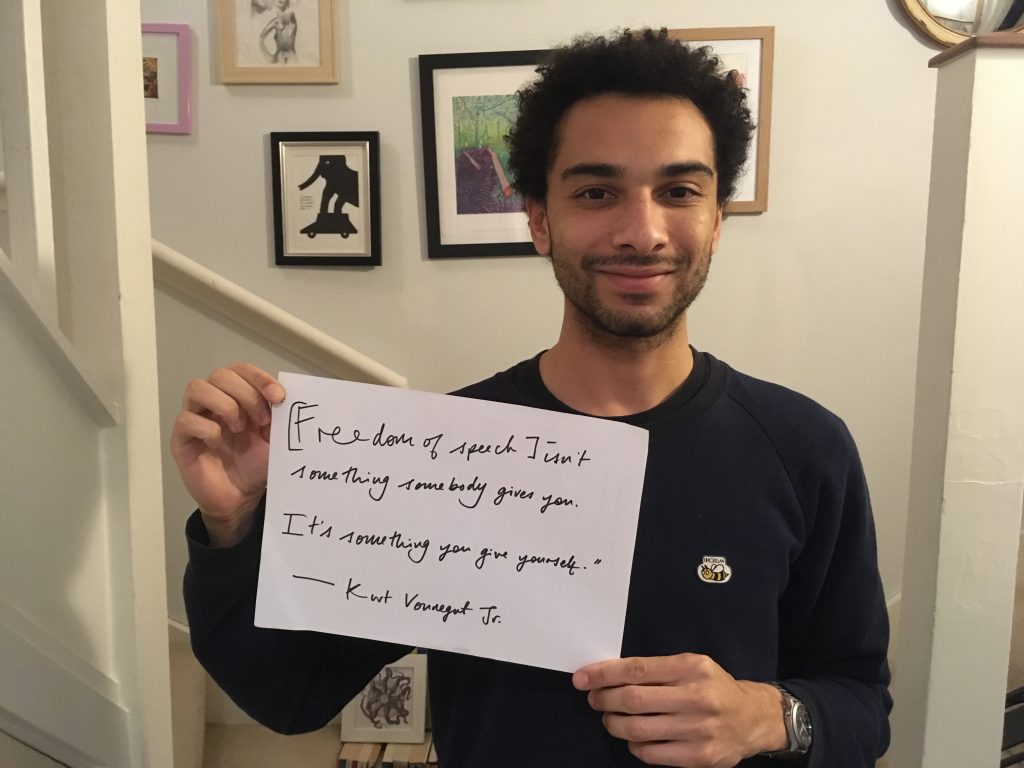 Samuel Rowe – London
Samuel Rowe – London
I am currently a postgraduate law student, having studied literature as an undergraduate in the UK and the USA. I hope to become a public law barrister, specialising in media and information law and human rights. Like the character in Kurt Vonnegut’s Hocus Pocus, I believe that the right to freedom of speech is innate. It is not a commodity; it is not something to be bargained with. My interest in issues surrounding freedom of speech directed my undergraduate dissertation, which focused on the western surveillance state. This sort of covert action can have the effect of creating an environment of self-censorship, and often has a disproportionate impact on marginalised communities. I looked at methods of resistance (of which there are many) to see how groups maintained freedom of speech under the gaze of the state. The suppression of freedom of speech is hardly a novel phenomenon and mass surveillance is just one way in which it is currently under threat. From White House officials calling disagreeable information “fake news” to irresponsible no platforming in universities, this is an era in which the limits and value of freedom of speech are being questioned. I believe that without freedom of speech, there can be no full interrogation of the evils which face us. And without interrogation, we risk losing sight of the full scope those evils might pose.
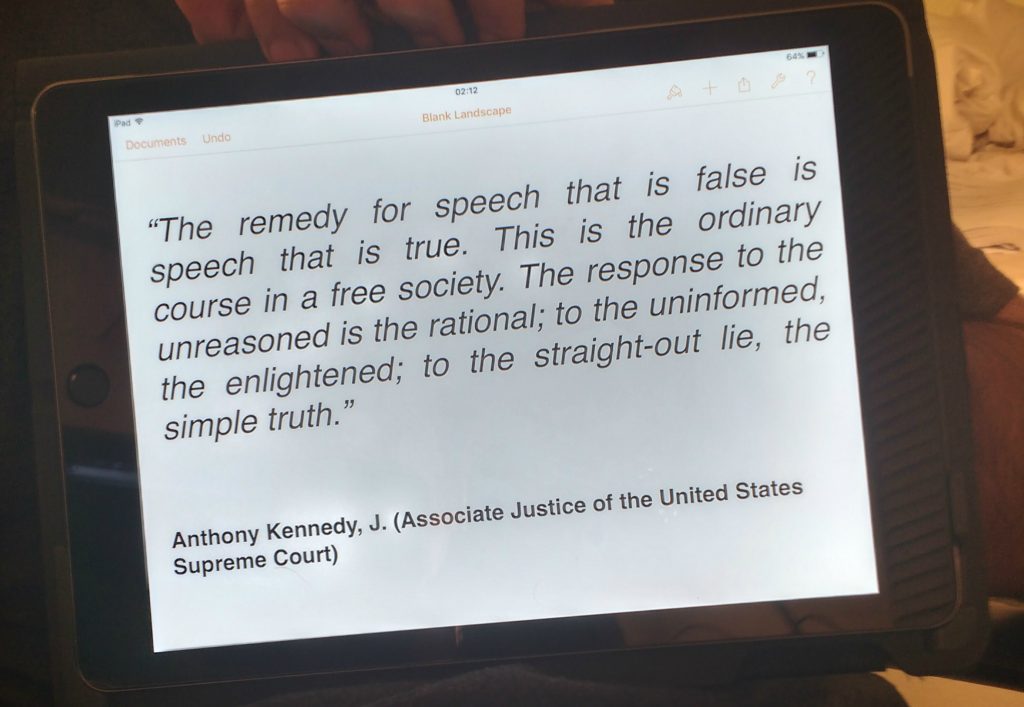 Tarun Krishnakumar – New Delhi
Tarun Krishnakumar – New Delhi
In recent times, there has been much concern expressed about the proliferation of “fake” news online and the impact it can have on democratic processes, politics and the public at large. These concerns have stirred various stakeholders – including governments, news media and internet intermediaries – into action. For instance, the German government recently declared fake news from Russia to be a significant threat to its upcoming elections. In a similar vein, internet giants like Google and Facebook – likely in the wake of unfavourable political outcomes – have been clamouring to show that they are willing to clamp down on content that is false or misleading.
In response to these developments, the quote I’ve selected manifests what, I feel, should be the appropriate response to fake speech: more “non-fake” speech – and not more regulation. While many justifications to clamp down on fake news may be well-intentioned, the history of regulating speech has shown us that inserting an intermediary into a conversation creates unintended and harmful consequences for free speech. Often this manifests as overt censorship while, in other cases, it is the creation of private arbiters of what may or may not be said on a platform – a more covert and creeping harm. Given the subjectivity in judging what news is “fake”, the debate also presents an excuse for regimes to tighten existing censorship controls or establish new ones.
The internet has given everyone an opportunity to have an equal say. This must be preserved at all costs. Fake news must be countered not through bans, blocking or regulation but by targeting the societal information asymmetries that allow it to flourish and creating conditions that facilitate society to produce more speech that is not “fake”. Policy efforts should focus on educating readers and providing them the tools to judge content for themselves – thereby minimising the effect of false or misleading content. For this, what is necessary is a culture of being exposed to a balanced diet of diverse content. When governments peddle nationalistic, religious, or political rhetoric in educational curricula and skew facts, little do they realise that they are creating the very conditions that allow “fake” news to flourish and have the harmful impacts that they complain of.
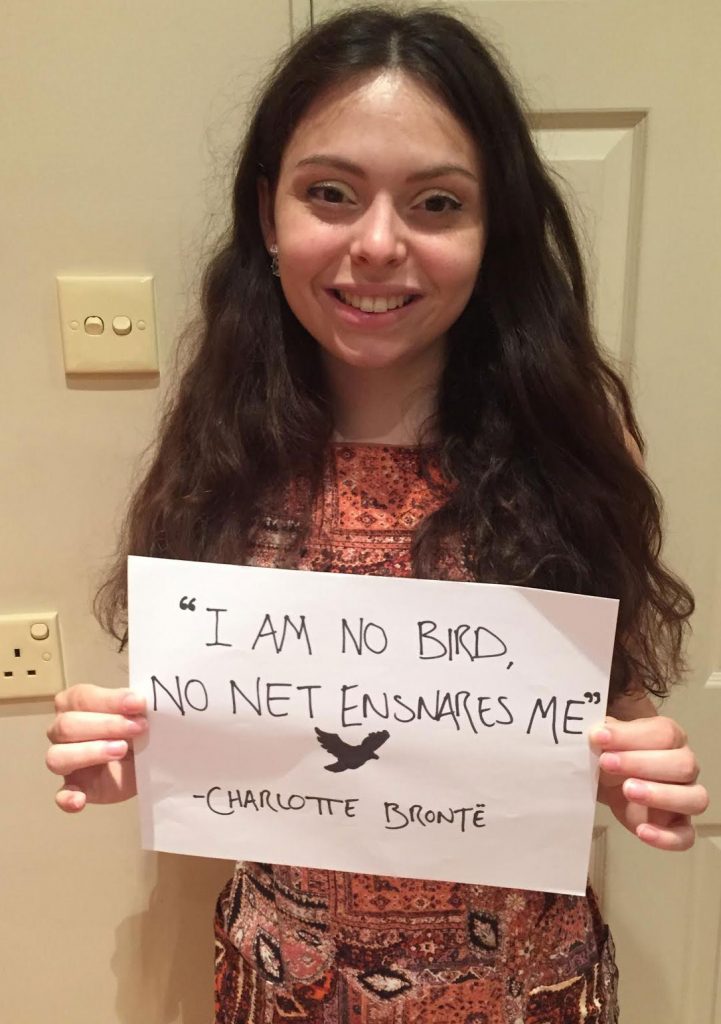 Sophia Smith-Galer – London
Sophia Smith-Galer – London
I’m a MA student studying broadcast journalism at City University in London. I studied Spanish and Arabic previously at Durham University and I’m particularly interested in how artists and writers overcome challenges to their freedom of expression in Latin America and the Middle East. As a singer I have always been intrigued by the imagery of a caged bird that sings despite its entrapment; Charlotte Bronte instead uses this metaphor to show how independent Jane Eyre has become by the end of the eponymous novel. Humans have always connected birds with freedom, or lack of – just look at Twitter’s logo – and so the quote really resonated with me.
Freedom of expression is particularly important to me as several countries that speak both of the languages I have dedicated years of study to continue to be plagued by tyrants and censors. I’m particularly interested addressing censorship in Latin America and the Middle East, especially with regard to the arts, as I’m also a classical singer and keen art historian.
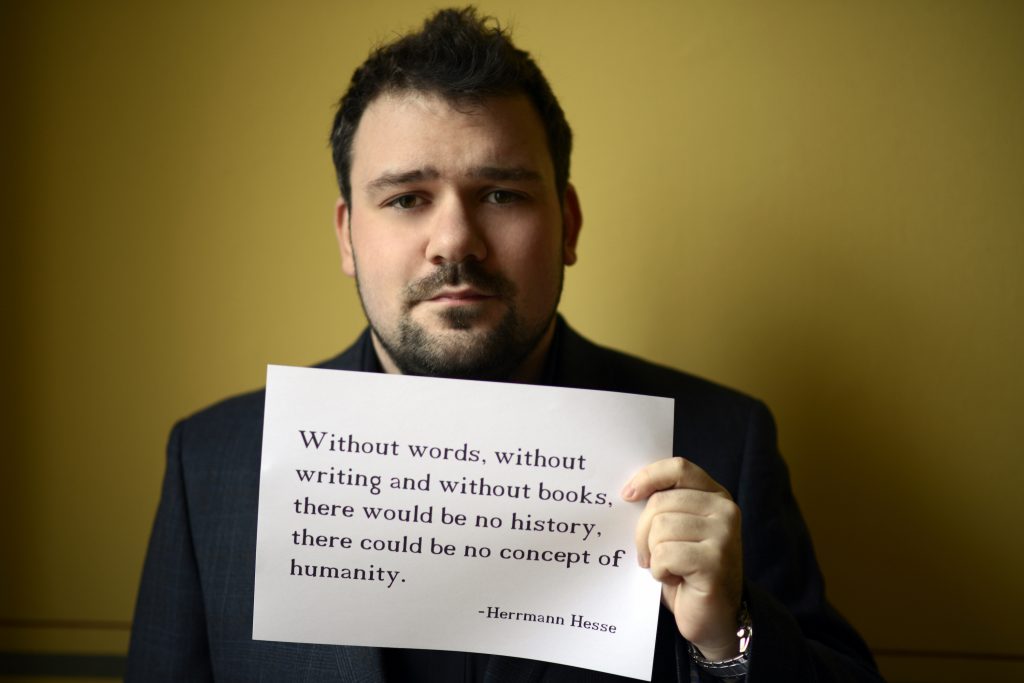 Constantin Eckner – St Andrews
Constantin Eckner – St Andrews
I am originally from Germany. I graduated from University of St Andrews with an MA degree in modern history. Currently, I am a PhD candidate specialising in human rights, asylum policy and the history of migration. Moreover, I have worked as a writer and journalist since I was 17 years old, covering a variety of topics over the years. Longer stays in cities like Budapest and Istanbul have raised my awareness for pressures exerted upon freedom of expression.
I chose this particular quote, because Hermann Hesse emphasised the importance of the written word and how it had an impact on the concept of humanity. In his time, Hesse was conscious that without writing it was not possible to express thoughts and spread ideas. Therefore, all those who fought the existence of the written word threatened humanity which was a frightening thought for a humanist like Hesse.
In a perfect world, every human being would live without fear of state censorship and potentially facing repercussions for the words they write—or for the pictures they draw, for the photos they shoot, for music they play.
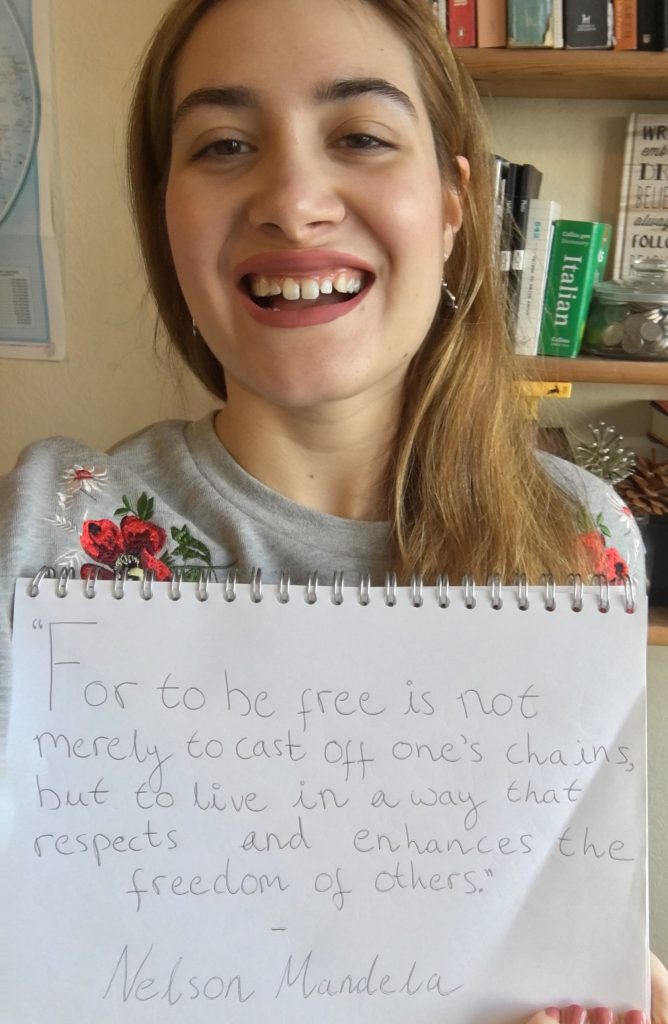 Isabela Vrba Neves – Stockholm
Isabela Vrba Neves – Stockholm
I’m half Brazilian and half Czech, raised in Sweden, but currently living in London where I work in communications for a mental health charity. I‘m also a Latin America correspondent for the International Press Foundation (IPF), a platform where young journalists get to write about stories that matter the most to them. It was during my time at Kingston University, studying journalism and French, when my interest in censorship and freedom of expression first emerged.
During my undergraduate studies I learned how important a free press is for a working democracy. It is a platform bringing together multiple voices, by sharing news, ideas and holding those in power to account. However, many journalists around the world suffer repression for simply doing their job and for using their right to free speech.
For me, Nelson Mandela‘s quote represents the importance of respecting and listening to each other, even with different views, but also highlighting the voices of those who are forced into silence.
Interviewing journalists from Venezuela and Pakistan, who face these types of constraints, has made me more engaged in sharing stories concerning freedom of expression, not only by journalists, but also by artists and activists. In the future, as a journalist, I want to focus on freedom of expression and by being part of the youth advisory board, I will be able to expand my knowledge and have great conversations with other young people who are passionate for justice and social change.[/vc_column_text][/vc_column][/vc_row][vc_row full_width=”stretch_row_content”][vc_column][three_column_post title=”More from the youth advisory board” category_id=”6514″][/vc_column][/vc_row]
8 Sep 2016 | Counter Terrorism, Digital Freedom, Europe and Central Asia, News and features

(Illustration: Shutterstock)
The appalling scene on the strand in Nice on Bastille Day. The dead at the airport and in the Metro in Brussels in March. Terrorist attacks, designed to inflict the highest possible level of fear and apprehension among ordinary citizens, is now ordinary in Europe.
The stakes were raised in earnest in January 2015 with the carnage at the editorial offices of the satirical magazine Charlie Hebdo in Paris, where 10 staffers were brutally murdered by terrorists.
How can such atrocities be avoided or squelched? That is the question.
We know Europeans want something to be done. Living in a perpetual state of fear is not the natural consequence of living in 21st century liberal democracies.
But neither is living in a police state, where personal privacy gives way to the exigencies of war, however unlike this war compares to ones of the past; where mere idle chatter can be misconstrued to the point that it becomes the criminal offense of glorifying terrorism.
Simply put, do our rights to personal privacy and free expression and free association vanish in order to provide a safer physical environment for our residents?
The answer, or answers are not easily arrived at; the debates are nuanced and people of good will and good character can find themselves on opposite sides of issues while both hoping for a similar outcome: peace, security and an open society that respects the inherent rights of individuals to live freely.
Under these difficult circumstances, I think it is important to make the case, once again, to protect individual rights in times of civil turmoil. To do so, I issued a statement earlier this month, as the OSCE Representative on Freedom of the Media setting out the arguments in favour of protection.
First and foremost, the Organization for Security and Co-operation in Europe, the world’s largest regional security body, appears fully on board with the notion of protection of these individual rights. The participating States, in the Astana Declaration of 2010, reiterated the commitment to comprehensive security and related the maintenance of peace to respect for human rights.
And in a Ministerial Council Decisions on Preventing and Countering Violent Radicalization that Lead to Terrorism and on Counter-terrorism that was adopted in 2015, the States confirmed the notion “..that respect for human rights, fundamental freedoms and the rule of law are complementary and mutually reinforcing with effective counter-terrorism measures, and are an essential part of a successful counter-terrorism effort.”
Furthermore, any counter-terrorism measures restricting the right to free expression and free media must be in compliance with international standards, most notably Article 19 of the UN Covenant on Civil and Political Rights and strictly adhere to the principles of legality, necessity and proportionality and implemented in accordance with the rule of law.
Read alone, these pronouncements ought to put an end to any notion that the rights and values inherent in an open society should not survive the fight against terrorism. But it has not. Across the OSCE region, which comprises 57 countries from North America to Mongolia, governments are considering laws that chip away at those fundamental rights.
As a result, I have suggested that lawmakers of OSCE participating States give ample weight and consideration to the following when addressing any legislation that would affect, in law or in practice, the right of people to exercise their human rights:
- Ensure journalists’ freedom and safety at all times, including while reporting on terrorism.
- Recognize that free expression and the use of new technologies are also tools to fight terrorism by creating social cohesion and expressing alternative narratives.
- Clearly and appropriately define, in line with international human rights law, the notions of violent extremism, terrorism, radicalisation and other terms used in legislation, programs and initiatives aimed to prevent and counter terrorism.
- Acknowledge that the media has a right to report on terrorism. Requests for media blackouts of terrorist activities must be avoided and media should be free to consider, based on ethical standards and editorial guidelines, available information to publish in the public interest.
- Fully respect the right of journalists to protect sources and provide a legal framework securing adequate judicial scrutiny before law enforcement and intelligence agencies can access journalists’ material in terror investigations.
- Refrain from indiscriminate mass surveillance because of its chilling effect on free expression and journalism. Targeted surveillance should be used only when strictly necessary, with judicial authorization and independent control mechanisms in place.
- Acknowledge that anonymity and encryption technologies may be the only guarantee for safe and secure communications for journalists and therefore are a prerequisite for the right to exercise freedom of expression. Blanket prohibitions are disproportionate and therefore unacceptable, and encryption regulation introducing “backdoors” and “key escrows” to give law enforcement and intelligence access to “the dark web” should not be adopted.
- Only restrict content that is considered a threat to national security if it can be demonstrated that it is intended to incite imminent violence, likely to incite such violence and there is a direct and immediate connection between the expression and the likelihood of occurrence of such violence.
- Review applicable laws and policies on counter-terrorism and bring them in line with the above principles.
Adherence to these simple rules is necessary because limiting the space for free expression and civic space advances the goals of those promoting, threatening and using terrorism and violence.
If we give up on our fundamental freedoms we will erode the very substance of democracy and the rule of law.
Recent columns by Dunja Mijatović
Dunja Mijatović : Turkey must treat media freedom for what it really is – a test of democracy
Dunja Mijatović: Why quality public service media has not caught on in transition societies
Dunja Mijatović: Chronicling infringements on internet freedom is a necessary task
28 Jun 2016 | Magazine, Magazine Contents, mobile, Volume 45.02 Summer 2016
[vc_row][vc_column][vc_custom_heading text=”Index on Censorship has dedicated its milestone 250th issue to exploring the increasing threats to reporters worldwide. Its special report, Truth in Danger, Danger in Truth: Journalists Under Fire and Under Pressure, is out now.”][vc_row_inner][vc_column_inner width=”1/2″][vc_column_text]
Highlights include Lindsey Hilsum, writing about her friend and colleague, the murdered war reporter Marie Colvin, and asking whether journalists should still be covering war zones. Stephen Grey looks at the difficulties of protecting sources in an era of mass surveillance. Valeria Costa-Kostritsky shows how Europe’s journalists are being silenced by accusations that their work threatens national security.
[/vc_column_text][/vc_column_inner][vc_column_inner width=”1/2″][vc_single_image image=”76283″ img_size=”full”][/vc_column_inner][/vc_row_inner][vc_column_text]
Kaya Genç interviews Turkey’s threatened investigative journalists, and Steven Borowiec lifts the lid on the cosy relationships inside Japan’s press clubs. Plus, the inside track on what it is really like to be a local reporter in Syria and Eritrea. Also in this issue: the late Swedish crime writer Henning Mankell explores colonialism in Africa in an exclusive play extract; Jemimah Steinfeld interviews China’s most famous political cartoonist; Irene Caselli writes about the controversies and censorship of Latin America’s soap operas; and Norwegian musician Moddi tells how hate mail sparked an album of music that had been silenced.
The 250th cover is by Ben Jennings. Plus there are cartoons and illustrations by Martin Rowson, Brian John Spencer, Sam Darlow and Chinese cartoonist Rebel Pepper.
You can order your copy here, or take out a digital subscription via Exact Editions. Copies are also available at the BFI, the Serpentine Gallery, MagCulture, (London), News from Nowhere (Liverpool), Home (Manchester) and on Amazon. Each magazine sale helps Index on Censorship continue its fight for free expression worldwide.
Index on Censorship magazine was started in 1972 and remains the only global magazine dedicated to free expression. It has produced 250 issues, with contributors including Samuel Beckett, Gabriel García Marquéz, Nadine Gordimer, Arthur Miller, Salman Rushdie, Margaret Atwood, and many more.
[/vc_column_text][/vc_column][/vc_row][vc_row][vc_column][vc_custom_heading text=”SPECIAL REPORT: DANGER IN TRUTH, TRUTH IN DANGER” css=”.vc_custom_1483444455583{margin-right: 0px !important;margin-left: 0px !important;border-bottom-width: 1px !important;padding-top: 15px !important;padding-bottom: 15px !important;border-bottom-color: #455560 !important;border-bottom-style: solid !important;}”][vc_column_text]
Journalists under fire and under pressure
Editorial: Risky business – Rachael Jolley on why journalists around the world face increasing threats
Behind the lines – Lindsey Hilsum asks if reporters should still be heading into war zones
We are journalists, not terrorists – Valeria Costa-Kostritsky looks at how reporters around Europe are being silenced by accusations that their work threatens national security
Code of silence – Cristina Marconi shows how Italy’s press treads carefully between threats from the mafia and defamation laws from fascist times
Facing the front line – Laura Silvia Battaglia gives the inside track on safety training for Iraqi journalists
Giving up on the graft and the grind – Jean-Paul Marthoz says journalists are failing to cover difficult stories
Risking reputations – Fred Searle on how young UK writers fear “churnalism” will cost their jobs
Inside Syria’s war – Hazza Al-Adnan shows the extreme dangers faced by local reporters
Living in fear for reporting on terror – Ismail Einashe interviews a Kenyan journalist who has gone into hiding
The life of a state journalist in Eritrea – Abraham T. Zere on what it’s really like to work at a highly censored government newspaper
Smothering South African reporting – Carien Du Plessis asks if racism accusations and Twitter mobs are being used to stop truthful coverage at election time
Writing with a bodyguard – Catalina Lobo-Guerrero explores Colombia’s state protection unit, which has supported journalists in danger for 16 years
Taliban warning ramps up risk to Kabul’s reporters – Caroline Lees recalls safer days working in Afghanistan and looks at journalists’ challenges today
Writers of wrongs – Steven Borowiec lifts the lid on cosy relationships inside Japan’s press clubs
The Arab Spring snaps back – Rohan Jayasekera assesses the state of the media after the revolution
Shooting the messengers – Duncan Tucker reports on the women investigating sex-trafficking in Mexico
Is your secret safe with me? – Stephen Grey looks at the difficulties of protecting sources in an age of mass surveillance
Stripsearch cartoon – Martin Rowson depicts a fat-cat politician quashing questions
Scoops and troops – Kaya Genç interviews Turkey’s struggling investigative reporters
[/vc_column_text][/vc_column][/vc_row][vc_row][vc_column][vc_custom_heading text=”IN FOCUS” css=”.vc_custom_1481731813613{margin-right: 0px !important;margin-left: 0px !important;border-bottom-width: 1px !important;padding-top: 15px !important;padding-bottom: 15px !important;border-bottom-color: #455560 !important;border-bottom-style: solid !important;}”][vc_column_text]
Rebel with a cause – Jemimah Steinfeld speaks to China’s most famous political cartoonist
Soap operas get whitewashed – Irene Caselli offers the lowdown on censorship and controversy in Latin America’s telenovelas
Are ad-blockers killing the media? – Speigel Online’s Matthias Streitz in a head-to-head debate with Privacy International’s Richard Tynan
Publishing protest, secrets and stories – Louis Blom-Cooper looks back on 250 issues of Index on Censorship magazine
Songs that sting – Norwegian musician Moddi explains how hate mail inspired his album of censored music
[/vc_column_text][/vc_column][/vc_row][vc_row][vc_column][vc_custom_heading text=”CULTURE” css=”.vc_custom_1481731777861{margin-right: 0px !important;margin-left: 0px !important;border-bottom-width: 1px !important;padding-top: 15px !important;padding-bottom: 15px !important;border-bottom-color: #455560 !important;border-bottom-style: solid !important;}”][vc_column_text]
A world away from Wallander – An exclusive extract of a play by late Swedish crime writer Henning Mankell
“I’m not prepared to give up my words” – Norman Manea introduces Matei Visniec, a surreal Romanian play where rats rule and humans are forced to relinquish language
Posting into the future – An extract from Oleh Shynkarenko’s futuristic new novel, inspired by Facebook updates during Ukraine’s Maidan Square protests
[/vc_column_text][/vc_column][/vc_row][vc_row][vc_column][vc_custom_heading text=”COLUMNS” css=”.vc_custom_1481732124093{margin-right: 0px !important;margin-left: 0px !important;border-bottom-width: 1px !important;padding-top: 15px !important;padding-bottom: 15px !important;border-bottom-color: #455560 !important;border-bottom-style: solid !important;}”][vc_column_text]
Index around the world: Josie Timms recaps the What A Liberty! youth project
[/vc_column_text][/vc_column][/vc_row][vc_row][vc_column][vc_custom_heading text=”END NOTE” css=”.vc_custom_1481880278935{margin-right: 0px !important;margin-left: 0px !important;border-bottom-width: 1px !important;padding-top: 15px !important;padding-bottom: 15px !important;border-bottom-color: #455560 !important;border-bottom-style: solid !important;}”][vc_column_text]
The lost art of letters – Vicky Baker looks at the power of written correspondence and asks if email can ever be the same
[/vc_column_text][/vc_column][/vc_row][vc_row][vc_column][vc_custom_heading text=”SUBSCRIBE” css=”.vc_custom_1481736449684{margin-right: 0px !important;margin-left: 0px !important;border-bottom-width: 1px !important;padding-bottom: 15px !important;border-bottom-color: #455560 !important;border-bottom-style: solid !important;}”][vc_column_text]Index on Censorship magazine was started in 1972 and remains the only global magazine dedicated to free expression. Past contributors include Samuel Beckett, Gabriel García Marquéz, Nadine Gordimer, Arthur Miller, Salman Rushdie, Margaret Atwood, and many more.[/vc_column_text][vc_row_inner][vc_column_inner width=”1/2″][vc_single_image image=”76572″ img_size=”full”][/vc_column_inner][vc_column_inner width=”1/2″][vc_column_text]In print or online. Order a print edition here or take out a digital subscription via Exact Editions.
Copies are also available at the BFI, the Serpentine Gallery, MagCulture, (London), News from Nowhere (Liverpool), Home (Manchester), Calton Books (Glasgow) and on Amazon. Each magazine sale helps Index on Censorship continue its fight for free expression worldwide.
 SUBSCRIBE NOW[/vc_column_text][/vc_column_inner][/vc_row_inner][/vc_column][/vc_row]
SUBSCRIBE NOW[/vc_column_text][/vc_column_inner][/vc_row_inner][/vc_column][/vc_row]
21 Oct 2015 | About Index, Academic Freedom, Counter Terrorism, Digital Freedom, Digital Freedom Statements, News and features, Statements
Good morning.
First I would like to thank the Internet Librarian International conference for inviting me to speak to you this morning. It is an honour to speak to a group of people who have been so important in forming me as a person. As a child I was the kind of person who got six books out of the library on a Saturday afternoon and had read all of them by Monday morning. I was addicted to reading, hooked on the spellbinding power and beauty of words.
Today I am very proud to work for an organisation that defends expression in all its forms; one that recognises not only the power of words, but also of images, of music, of performance – to convey ideas, thoughts, opinions and feelings.
In this morning’s talk I want to talk about how we balance what often seems like competing rights: the rights to privacy, security – the right to life – and freedom of expression in an information age. I want to argue that these should not be seen as mutually exclusive rights but importantly symbiotic rights, which must co-exist equally for the other to survive. I will illustrate this from examples from our work at Index on Censorship, and consider some of the challenges and causes for optimism for the next few years.
First, a little about Index on Censorship. Index on Censorship is a 43 year old organisation founded by the poet Stephen Spender in response to what seemed like a simple request: what could the artists and intellectuals of the West do to support their counterparts behind the Iron Curtain and those under the thumb of oppressive regimes elsewhere? Organisations like Amnesty and PEN already existed, doing then – as now – a formidable job of petitioning and campaigning, particularly on the cases of the imprisoned. What more could be done? The answer – those who established Index decided – was to publish the works of these censored writers and artists and stories about them. Index on Censorship magazine was born and we have continued to produce the magazine – this magazine – on at least a quarterly basis ever since. The motivation, as Stephen Spender wrote in the first edition of the magazine, was to act always with concern for those not free, responding to the appeals from Soviet writers to their Western counterparts. “The Russian writers,” Spender wrote, “seem to take it for granted that in spite of the ideological conditioning of the society in which they live, there is nevertheless an international community of scientists, writers and scholars thinking about the same problems and applying to them the same human values. These intellectuals regard certain guarantees of freedom as essential if they are to develop their ideas fruitfully… Freedom, for them, consists primarily of conditions which make exchange of ideas and truthfully recorded experiences possible.”
I will come back later to that notion of ‘conditions which make exchange of ideas possible’ as a central tenet of my argument regarding the essential interplay between privacy and free expression.
I hope you will allow me a brief pause before that, however, to describe to you the evolution of Index. Over time, Index has developed a campaigning and advocacy arm in addition to its publishing work, but we remain focused on the notion that it is that by providing a voice to the voiceless – by providing the information that others seek to keep from us – that we take the first important steps to overcoming censorship.
Why is it important to tackle censorship? Sometimes we forget to ask ourselves this question because we take it for granted that freedom is a good thing. Consider all those who were quick to shout ‘Je Suis Charlie’ following the attacks on French satirical magazine Charlie Hebdo – the knee jerk reaction in Western liberal democracies is often to say you are for free speech, without ever really stopping to consider why you might be for it. Or why free speech is and of itself a good thing.
I would argue this failure to understand the value of free speech lies at the heart of one of the dilemmas we face in modern democracies where free speech is being gradually eroded – where ‘Je Suis Charlie’ quickly became ‘Je Suis Charlie, but…’.
It is vital to understand the value inherent in free expression to understand why some of the current tensions between privacy and security on the one hand and free speech on the other exist. It is also crucial for understanding ways to tackle the dangerous trade offs that are increasingly being made in which free expression is seen as a right that can legitimately be traded off against privacy and security.
So forgive me for what might seem like making a small diversion to rehearse some of the arguments on the value of free expression. Locke, Milton, Voltaire have all written eloquently on the benefits of free expression, but I think Mill expresses it best when he talks of free expression being fundamental to the “permanent interests of man as a progressive being.” “The particular evil of silencing the expression of an opinion,” he argues in On Liberty, “is that it is robbing the human race… If the opinion is right, they are deprived of the opportunity of exchanging error for truth; if wrong, they lose, what is almost as great a benefit, the clearer perception and livelier impression of truth produced by its collision with error.”
This latter argument is particularly powerful when we consider, for example, the introduction of Holocaust denial laws. Such laws suggest that there are some truths so precious that they have to be protected by laws, rather than having their truth reinforced by repeated “collision with error.” You can imagine authoritarian regimes everywhere looking at such laws and rubbing their hands with glees at the prospect of being able to impose a single view of history on the populace, without any kind of challenge.
The free exchange of ideas, opinions, and information is in Mill’s – and others’ – doctrine a kind of positive cacophony from which clear sounds emerge. In this doctrine, it is not just the having of ideas, but the expressing of them that becomes vital. And it is here that those who would pit freedom of expression against privacy find grounds for the undermining of the latter. If the goal of free expression is the exchange of ideas for the better progression of mankind through the discovery of truths, then keeping ideas secret undermines that goal.
This is the particularly pervasive argument used in Western liberal democracies to justify surveillance. If you have nothing to hide, you have nothing to fear, the mantra goes: in liberal democracies, we’re not interested in your ideas, we’re just out to get the bad guys committing crimes. It shouldn’t stop you expressing yourself.
Except that it does. Anyone who has read Dave Eggers book The Circle will be familiar with a world in which privacy is demolished, in which every action and movement is recorded – in an inversion of Mill’s vision – for the betterment of society. The result is a world in which actions and habits are changed because there is no longer a private sphere in which thought and behaviour can developed. And it is a world that is not just a dystopian alternative reality. A study by the PEN American center earlier this year demonstrated that knowledge of mass surveillance by governments is already changing the way in which writers work. The report, Global Chilling, showed an astonishing one third of writers – 34 percent – living in countries deemed “free” – based on the level of political rights and civil liberties – have avoided writing or speaking on a particular topic, or have seriously considered it, due to fear of government surveillance. Some 42 percent of writers in “free countries” have curtailed or avoided activities on social media, or seriously considered it, due to fear of government surveillance, the survey found.
In countries that are not free, the consequence of a lack of privacy is acute. Colleagues in Azerbaijan, for example, note that authorities are quick to demonstrate the country’s openness by arguing a lack of curbs on social media.
As one commentator points out, such curbs are unnecessary, because as soon as an individual expresses an opinion unpalatable to government on an outlet such as Twitter, they are soon targeted, arrested, and jailed – often on spurious charges unrelated to free speech but which effectively at curbing it.
We are now also seeing, increasingly, the tactics pursued by illiberal regimes being adopted by supposedly liberal ones. Consider the use for example of UK anti-terror laws to snoop on the phone calls of the political editor of The Sun newspaper. British police used the Regulation of Investigatory Powers Act – legislation introduced explicitly to tackle terrorism – to obtain the phone records of Tom Newton Dunn for an investigation into whether one of its officers had leaked information about a political scandal, thereby seriously comprising the basic tenet of a free and independent media: the confidentiality of sources.
And such methods, indeed even the hardware, are being used elsewhere to quash free expression. As the journalist Iona Craig wrote for Index on Censorship magazine last year: “Governments going after journalists is nothing new. But what is increasingly apparent is that those listening and watching when we work in countries infamous for their consistent stifling of freedom of speech and obstruction of a free press, are often doing so with the infrastructure, equipment or direct support of supposedly “liberal” Western nations.
Craig, a regular reporter from Yemen, describes the phone tapping and other surveillance methods that put her and her sources at risk and how she and her colleagues are resorting to traditional methods of reporting – meeting contacts in person, using pen and paper, to evade surveillance.
Privacy, then, is vital for communication, for the free exchange of ideas and information. Index knows this from a long history that has ridden both the analogue and the digital wave. In our latest edition of the magazine, for example, retired primary school teacher Nancy Martinez Villareal recalls smuggling pieces of information to the Revolutionary Left Movement in Chile in documents hidden in lipstick tubes. Copies of our own magazine were smuggled into eastern Europe during the 1980s, by intrepid reporters hiding the copies under bunches of then much-coveted bananas. We ourselves now communicate with persecuted individuals in some of the world’s most repressive environments for free speech using encrypted communications such as PGP. Again in the latest edition of the magazine, Jamie Bartlett, director of the Centre for the Analysis of Social Media at the Demos think tank, writes about new auto-encryption email services such as Mailpile and Dark Mail that will allow private communication to evade the censors. In addition to these services, projects like Ethereum and Maidsafe are building an entirely new web out of the spare power and hard drive space of millions of computers put on the network by their owners. Because the network is distributed across all these individual computers, it is more or less impossible to censor.
Surveillance is just one example in which we see the argument of security being used to justify incursions into an array of civil liberties from privacy to free expression.
In fact, privacy campaigners have been at the forefront of campaigning against mass surveillance and other techniques.
And while I hope I have shown that privacy and free expression are both necessary so that the other can flourish, it would be remiss of me not to caution against any temptation to let privacy rights – which often appear all the more important in both an age of mass surveillance and a bare-all social media culture – trump freedom of expression in such a way that they prevent us, as per the Mill’s doctrine, coming closer to the truth.
It is for this reason that Index on Censorship opposed the so-called ‘Right to be Forgotten’ ruling made in Europe last year. Europe’s highest court ruled in May 2014 that ‘private’ individuals would now be able to ask search engines to remove links to information they considered irrelevant or outmoded. In theory, this sounds appealing. Which one of us would not want to massage the way in which we are represented to the outside world? Certainly, anyone who has had malicious smears spread about them in false articles, or embarrassing pictures posted of their teenage exploits, or even criminals whose convictions are spent and have the legal right to rehabilitation. In practice, though, the ruling is far too blunt, far too broad brush, and gives far too much power to the search engines.
The ruling came about after a Spanish man, Mario Costeja González requested the removal of a link to a digitised 1998 article in La Vanguardia newspaper about an auction for his foreclosed home, for a debt that he had subsequently paid. Though the article was true and accurate, Costeja Gonzalez argued that the fact this article was commonly returned in name searches gave an inaccurate picture of him. After hearing the case, the European Court of Justice ruled that search engines must remove links to any content that is “inadequate, irrelevant or no longer relevant”. The content itself is not deleted, but Google will not list it in search results.
Index warned at the time that the woolly wording of the ruling – its failure to include clear checks and balances, or any form of proper oversight – presented a major risk. Private companies like Google should not be the final arbiters of what should and should not be available for people to find on the internet. It’s like the government devolving power to librarians to decide what books people can read (based on requests from the public) and then locking those books away. There’s no appeal mechanism, very little transparency about how search engines arrive at decisions about what to remove or not, and very little clarity on what classifies as ‘relevant’. Privacy campaigners argue that the ruling offers a public interest protection element (politicians and celebrities should not be able to request the right to be forgotten, for example), but it is over simplistic to argue that simply by excluding serving politicians and current stars from the request process that the public’s interest will be protected.
We were not the only ones to express concern. In July last year the UK House of Lords’s EU Committee published a report claiming that the EU’s Right to be Forgotten is “unworkable and wrong”, and that it is based on out-dated principles.
“We do not believe that individuals should have a right to have links to accurate and lawfully available information about them removed, simply because they do not like what is said,” it said.
Here are some examples of stories from the UK’s Telegraph newspaper to which links have been removed since the ruling:
• A story about a British former convent girl who was jailed in France for running a ring of 600 call girls throughout Europe in 2003. Police were tipped-off about her operation by a former colleague following an argument.
• An article from 2008 about a former pupil from a leading boarding school who returned to his halls of residence after a night out drinking and drove his car around the grounds at speeds of 30mph before crashing. The Telegraph goes on to add: “He eventually collided with a set of steps in a scene reminiscent of the 1969 cult classic movie starring Michael Caine. His parents had given him the silver Mini just the day before.”
• A story which includes a section taken from the rambling “war plan” of Norwegian man Anders Behring Breivik to massacre 100 people.
• A story from 2009 on The Telegraph’s property page documenting how a couple and their two sons gave up pressured London life and moved into a rolling Devon valley.
Search engines removed such articles at the request of indviduals. Publishers have no real form of appeal against the decision, nor are the organisations told why the decision was made or who requested the removals. Though the majority of cases might be what privacy campaigners deem legitimate – such as smear campaigns – the ruling remains deeply problematic. We believe the ruling needs to be tightened up with proper checks and balances – clear guidelines on what can and should be removed (not leaving it to Google and others to define their own standards of ‘relevance’), demands for transparency from search engines on who and how they make decisions, and an appeals process. Without this, we could find that links to content that is true, factual, legitimately obtained – and indeed vitally relevant for the searcher, even if not deemed to be so by the individual – could be whitewashed from history.
In this way we see that protection of the individual, using notions of harm defined by the individual themselves – is used as an argument for censorship. I want to use the remainder of my talk to discuss ways in which this drive to shield from potential and perceived harm, is having an impact.
Let us start with libraries and the example of the United States’ Children’s Internet Protection Act (CIPA), which brought new levels of Internet censorship to libraries across the country. CIPA was signed into law in 2000 and found constitutional by the Supreme Court in 2003: two previous attempts at legislating in this area – the Communications Decency Act and the Child Online Protection Act, were held to be unconstitutional by the US Supreme Court on First Amendment grounds.
As the Electronic Frontier Foundation has written eloquently on this, the law is supposed to encourage public libraries and schools to filter child pornography and obscene or “harmful to minors” images from the library’s Internet connection. However, as with all such laws, the devil is in the implementation not the original intention.
Schools and libraries subject to CIPA must certify that the institution has adopted an internet safety policy that includes use of a “technology protection measure”— in other words filtering or blocking software — to keep adults from accessing images online that are obscene or child pornography. The filtering software must also block minors’ access to images that are “harmful to minors,” in other words, sexually explicit images that adults have a legal right to access but would be inappropriate for young people.
Only images, not text or entire websites, are legally required to be blocked. Libraries are not required to filter content simply because it is sexual in nature. Libraries aren’t required to block social networking sites, political sites, sites advocating for LGBT issues, or sites that explore controversial issues like euthanasia.
However, this is what happens – either through technological illiteracy or overzealous implementation.
As all of you will be aware, filters don’t work effectively. Not only can filters block perfectly legitimate content, they can also fail to block certain content that is obscene.
We saw this in the case of Homesafe, a network-level filter that was being offered by one of Britain’s largest internet providers. The filter was designed to block adult content on the network level, but in late 2011 IT expert Cherith Hateley demonstrated that the filter failed to block Pornhub, which offers thousands of free explicit videos and is ranked as the third largest pornography provider on the web. Hateley found that on the Pornhub website the HomeSafe blocking page had been relegated to a small box normally reserved for advertising, leaving its adult content fully accessible.
In addition to the challenge of poor filtering, there is the problem of transparency. We don’t know exactly what’s being blocked. There’s no documentation of which libraries are filtering what specific websites and most filtering technology companies keep their algorithms for blocking sites a closely guarded secret. Without clarity on precisely what is being blocked, by whom, and how often, it’s impossible to know what content is being filtered and therefore whether libraries are being over censorious.
Where does this leave ethics? Librarians play an important role in ensuring free speech online. The American Library Association’s code of ethics states: “We uphold the principles of intellectual freedom and resist all efforts to censor library resources.”
This impulse to protect from harm is also seeping away from internet controls and filters into the broader public discourse and nowhere is this more alarming than in universities. I want to argue that the impulse I described earlier – of a private realm that is so crucial for the development of ideas and in some cases their incubation and dissemination – is being warped by an extension of the idea of personal physical safety into a demand for a kind of safety from ideas that is shutting down debate more widely.
It is clear that something is going wrong at universities. Institutions that should be crucibles for new thinking, at the forefront of challenges to established thought and practice, are instead actively shutting down debate, and shying away from intellectual confrontation.
Driven by the notion that students should not be exposed to ideas they find – or might find – offensive or troubling, student groups and authorities are increasingly squeezing out free speech – by banning controversial speakers, denying individuals or groups platforms to speak, and eliminating the possibility of “accidental” exposure to new ideas through devices such as trigger warnings.
The trend was particularly noticeable last year when a number of invited speakers withdrew from university engagements – or had their invitations rescinded – following protests from students and faculty members. Former US Secretary of State Condoleezza Rice withdrew from a planned address at Rutgers University in New Jersey after opposition from those who cited her involvement in the Iraq war and the Bush administration’s torture of terrorism suspects; Brandeis University in Massachusetts cancelled plans to award an honorary degree to Islam critic Ayaan Hirsi Ali; and Christine Lagarde backed out of a speech at Smith College following objections by students over the acts of the International Monetary Fund, which Lagarde runs. In the UK, the University of East London banned an Islamic preacher for his views on homosexuality. And a new law – a counter-terrorism bill – was proposed in Britain that could be used to force universities to ban speakers considered “extremist”.
Registering your objection to something or someone is one thing. Indeed, the ability to do that is fundamental to free expression. Actively seeking to prevent that person from speaking or being heard is quite another. It is a trend increasingly visible in social media – and its appearance within universities is deeply troubling.
It is seen not just in the way invited speakers are treated, but it stretches to the academic fraternity itself. Last year, the University of Illinois at Urbana-Champaign withdrew a job offer to academic Steven Salaita following critical posts he made on Twitter about Israel.
In an open letter, Phyllis Wise, University of Illinois at Urbana-Champaign chancellor, wrote: “A pre-eminent university must always be a home for difficult discussions and for the teaching of diverse ideas… What we cannot and will not tolerate at the University of Illinois are personal and disrespectful words or actions that demean and abuse either viewpoints themselves or those who express them. We have a particular duty to our students to ensure that they live in a community of scholarship that challenges their assumptions about the world but that also respects their rights as individuals.”
These incidents matter because, as education lecturer Joanna Williams wrote in The Telegraph newspaper: “If academic freedom is to be in anyway meaningful it must be about far more than the liberty to be surrounded by an inoffensive and bland consensus. Suppressing rather than confronting controversial arguments prevents criticality and the advance of knowledge, surely the antithesis of what a university should be about?”
Yet, increasingly, universities seem to want to shut down controversy, sheltering behind the dangerous notion that protecting people from anything but the blandest and least contentious ideas is the means to keep them “safe”, rather than encouraging students to have a wide base of knowledge. In the US, some universities are considering advising students that they don’t have to read material they may find upsetting, and if they don’t their course mark would not suffer. The introduction of “trigger warnings” at a number of universities is a serious cause for concern.
In the UK, increasing intolerance for free expression is manifest in the “no platform” movement – which no longer targets speakers or groups that incite violence against others, but a whole host of individuals and organisations that other groups simply find distasteful, or in some way disqualified from speaking on other grounds.
The decision to cancel an abortion debate at Oxford in late 2014, which would have been held between two men – and noted free speech advocates – came after a slew of objections, including a statement from the students’ union that decried the organisers for having the temerity to invite people without uteruses to discuss the issue. More recently, a human rights campaigner was barred from speaking at Warwick University – a decision that was subsequently overturned – after organisers were told she was “highly inflammatory and could incite hatred” and a feminist was banned from speaking at the University of Manchester because her presence was deemed to violate the student union’s “safe space” policy.
Encountering views that make us feel uncomfortable, that challenge our worldview are fundamental to a free society. Universities are places where that encounter should be encouraged and celebrated. They should not be places where ideas are wrapped in cotton wool, where academic freedom comes to mean having a single kind of approved thinking, or where only certain “approved” individuals are allowed to speak on a given topic.
Index on Censorship knows well the importance of the scholar in freedom of expression. Though we have come to be known as Index, the charity itself is officially called Writers and Scholars Educational Trust, an effort to capture as simply as possible the individuals whom we intended to support from the outset. The title was never intended to be exclusive, but the inclusion of “scholar” signals the importance our founders attached to the role of the academic as a defender and promoter of free speech. In 2015, as we watch the spaces for free expression narrow, I hope that together we can work doubly hard to ensure that traditional bastions for free speech – such as universities and indeed libraries – remain arena for the clash of ideas, not the closure of minds.
 Fionnuala McRedmond – Dublin
Fionnuala McRedmond – Dublin Júlia Bakó – Budapest
Júlia Bakó – Budapest Samuel Earle – Paris
Samuel Earle – Paris  Samuel Rowe – London
Samuel Rowe – London Tarun Krishnakumar – New Delhi
Tarun Krishnakumar – New Delhi Sophia Smith-Galer – London
Sophia Smith-Galer – London Constantin Eckner – St Andrews
Constantin Eckner – St Andrews Isabela Vrba Neves – Stockholm
Isabela Vrba Neves – Stockholm
